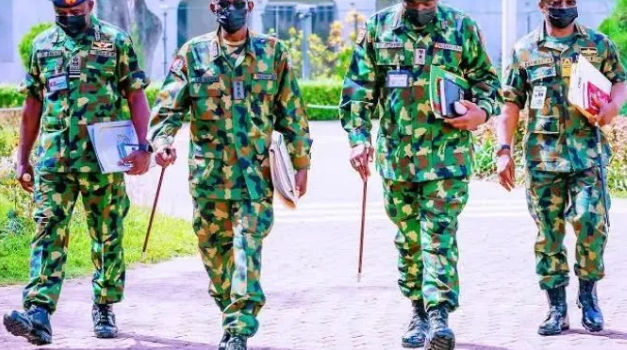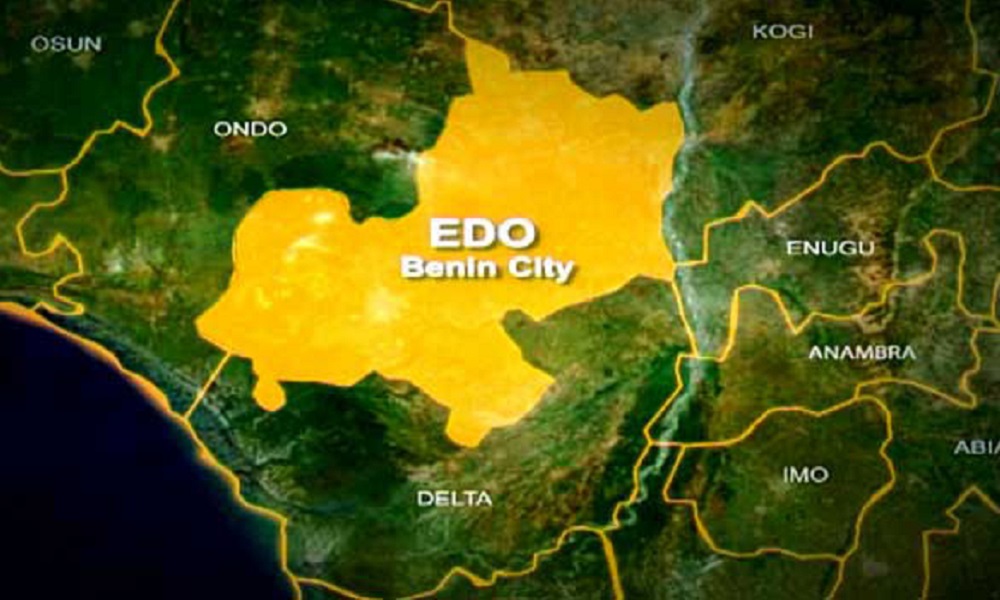News
10 Generals Retire From Nigerian Army (See Full List)

By Kayode Sanni-Arewa
Ten officers of the Nigerian Army, all on the ranks of a general, have retired from active service after successfully serving out their required number of years.
The Generals, from the Nigerian Army Armoured Corps (NAAC), comprise six Major-Generals and four Brigadier-Generals.
They include: Major-General Nsor Okpa Ojiji, Major-General MH Magaji, Major-General GB Audu, Major-General M Danmadami, Major-General JG Mohammed and Major-General UI Mohammed.
Others are Brigadier-General A. Israel, Brigadier-General BA Mohammed, Brigadier-General D. Abdulsalam and Brigadier-General SP Akpan.
Speaking on behalf of the others who were also pulled out of service, Ojiji expressed delight at being able to complete the years of active service successfully and commended the Army leadership for the roles played.
He, however, appealed that more be done for those still in service to make them perform optimally in the service of the nation.
“We recall that the Nigerian Army Armoured Corps (NAAC) has a lot of challenges, which range from poor accommodation to inadequate professional and medical facilities, amongst a myriad of others.
“Today, however, I am happy to note that there are many very functional accommodation blocks; even the ambience of these barracks is very welcoming. Many resources and efforts have changed the situation. This is heartwarming.
“Kudos to commander NAAC, his team of officers, soldiers, and their families, who are determined together that things must improve in the corps,” he said.
Ojiji highlighted the need to address poor equipment grading, especially in formations and units and appealed to the Minister of Defence to look into it.
He added, “We hope that the minister of defence, Alhaji Badaru Abubakar, also make this his cardinal objective during his tenure. I plead with the Hon. Minister through this medium to deem it fit to do so.“
On his part, the commandant of the Armoured Corps, Major General Mohammed Ahmed, congratulated the retired officers, wished them well in their future endeavours and urged them to make themselves readily available for consultations and helpful advice on improving the Armoured Corps.
“We are happy we did what we should do. We carry out a lot of services to the community, ranging from free medical services to the provision of pipe-borne water, among others, and if they tell us about their problems, we promptly attend to those problems.
“There is no army in the world that has enough, and the Nigerian Army has developed its capacity to the level that you can see in most of our equipment, which is highly maintained,” Ahmed said.
News
Speaker Abbas Commends Perfomance Of 10th Assembly

By Gloria Ikibah
The Speaker House of Representatives, Rep. Tajudeen Abbas, has praised the 10th Assembly for what he described as a period of sustained activity and impactful work since it was inaugurated nearly two years ago.
According to him, the House has taken a hands-on approach to governance and legislative duties, driven by a well-defined agenda with bold goals and measurable outcomes.
Speaker Abbas made the remarks during the first-ever Policy Dialogue centred on the House’s Legislative Agenda organised in collaboration with the Office of the Speaker, the Policy and Legal Advocacy Centre (PLAC), the National Assembly Library Trust Fund (NALTF), and UK International Development on MondayinAbuja.
The event brought together key figures from both federal and state institutions, as well as members of the private sector and representatives of foreign missions.
News
SAD! Woman, child electrocuted in Edo

A 32-year-old woman has been reportedly electrocuted by a cable belonging to the Benin Electricity Distribution Company (BEDC).
The woman and her baby were said to be electrocuted to death by a cable beneath a flooded road she was walking on after a heavy downpour.
The incident was said to have occurred on May 7th, 2025 at the Oregbeni area of Benin City, Edo State capital.
The woman, identified as Sarah David, was said to have had her baby strapped on her back when the tragedy occurred.
The cable was said to have fallen from one of the electricity poles in the neighborhood.
An eyewitness who simply identified herself as Edugie said: “the woman was also walking with a toddler believed to be her eldest child when the tragedy struck.
But for a passer-by who quickly rescued the toddler from the water, the entire family would have been wiped out.
“But for a passer-by who quickly rescued the toddler from the water, the entire family would have been wiped out.
“After the incident, some residents in the area called on the authorities of the Benin Electricity Distribution company (BEDC) to interrupt electricity supply to the area after which the corpses were removed from the flooded area.
The incident occurred on May 7th, 2025 at the Oregbeni axis of the Benin-Agbor Road,” the witness stated.
The husband of the deceased woman, Mr Samuel Ibom David bemoaned the death of his wife and baby.
He appealed to members of the public to assist him with funds to pay his late wife bride price and enable him approach her family for proper burial.
The management of Benin Disco were yet to respond to the tragedy at the time of filing this report on Sunday evening.
News
10th House extraordinarily proactive, productive for two years – Speaker Abbas

The Speaker of the House of Representatives Hon. Abbas Tajudeen, has said the 10th House has been proactive and productive since its inauguration almost two years ago.
Speaker Abbas also noted that the Legislative Agenda of the 10th, with far-reaching and ambitious proposals and targets, has produced results.
The Speaker made this known in Abuja on Monday at the inaugural Policy Dialogue on the Legislative Agenda of the House, which had top government officials and organisations at the federal and state levels in attendance. The private sector and the diplomatic corps were also represented.
The event was organised by the Office of the Speaker in conjunction with the Policy and Legal Advocacy Centre (PLAC); the National Assembly Library Trust Fund (NALTF), and the UK International Development.
Speaker Abbas said: “Two years later, I am proud to report that these efforts have yielded results. In terms of legislative output, this House has been extraordinarily proactive and productive. We have introduced a record number of bills and a volume of legislative proposals that is unprecedented at this stage of any assembly.
“More important than quantity, however, is the impact: these bills and motions are geared towards the critical reforms our country urgently needs. Already, many of the significant bills that we passed have received presidential assent.”
The Speaker said the dialogue is “a clear demonstration of our shared effort to promote parliamentary accountability, transparency, and a truly citizen-driven legislature.”
While recalling how the 10th pledged to regularly engage with Nigerians, report on its performance, and adjust its course based on the people’s feedback, the Speaker noted that the dialogue is part of that promise, “serving as a precursor to the upcoming Open NASS Week, where we open our doors to scrutiny and present our midterm progress.”
Speaker Abbas emphasised that the goal of the event is not only to celebrate the House’s achievements but also to candidly examine areas for improvement in the spirit of openness and democratic inclusion. He said that as the House prepares to mark the midpoint of its tenure, it is significant to reflect on its journey so far.
He said: “When the 10th House was inaugurated in June 2023, Nigeria faced significant challenges. The economy was weak, and there were pressing development and security crises. The populace was understandably frustrated and lost hope in democracy’s ability to meet their aspirations. This was followed by the shock of the removal of fuel subsidies, which exacerbated economic hardships and increased public anxiety. We recognised that extraordinary times required an extraordinary response from the legislature.
“Therefore, from the onset, the House dedicated itself to creating and implementing the most ambitious legislative agenda in our history. Designed to deliver good governance, this agenda aims to restore hope in democracy for our people.”
Speaker Abbas pointed out that the Legislative Agenda was not crafted in isolation but a product of extensive consultations with key stakeholders, including ministries and agencies, civil society, and development partners. He recalled how the House produced a comprehensive roadmap to guide its law-making, oversight, and representation from 2023 to 2027.
The Speaker stressed that the House took special care to align its priorities with the ‘Renewed Hope Agenda’ of the President Bola Ahmed Tinubu-led administration, ensuring synergy between the legislative and executive arms of government.
“Thus, our agenda embodies collaborative governance by engaging in dialogue with the Executive. This approach allows us to fulfil our independent mandate while ensuring that our legislative actions support national objectives and address the pressing needs of our citizens,” he stated.
Speaker Abbas explained that the agenda encompasses eight broad priority areas that address Nigeria’s diverse needs. These include strengthening good governance, enhancing national security, revitalising the economy, reforming our laws, and promoting social development. It also advocates for inclusion through an open parliament, directs foreign policy in the national interest, and tackles climate and environmental sustainability.
He said: “Never has a House of Representatives set such an expansive and forward-looking legislative blueprint. The impact the 10th House has made thus far is largely due to the deliberate, strategic, and focused execution of this agenda. We have remained focused and resilient in pursuing these goals, even when unforeseen issues arose.
“We backed our plan with concrete implementation strategies. Each House committee integrated the agenda into its work plans; we established clear milestones and key performance indicators to track progress, and we set up special committees to monitor and evaluate how well we are meeting our targets.
“We also insisted on better communication and regular reporting, which included requiring members to maintain functional constituency offices and report on their engagement with the public, ensuring accountability at every step.”
He added: “Crucially, our agenda was designed with the flexibility to respond to emerging crises. This means that even as new challenges have arisen, we have adapted swiftly without losing sight of our long-term goals. In short, we did not simply announce an ambitious agenda and hope for the best; we put in place the mechanisms and political will to implement it.”
When it comes to representation, Speaker Abbas stated that the members have endeavoured to make the 10th House “a citizen-driven legislature in practice, not just in words.” He said: “In every major endeavour, we have actively sought the people’s voice.”
-

 News21 hours ago
News21 hours agoWho Is Usoro Akpabio? Tinubu’s New MD for South-South Development Commission
-

 News13 hours ago
News13 hours agoJust in: Wike admits Fubara alongside 2 govs visited him on reconciliatory moves
-

 Politics21 hours ago
Politics21 hours agoJust in: PDP leaders plan to grab power as govs, ex-govs meet
-

 Politics21 hours ago
Politics21 hours agoWatch moment Wike arrives for PDP meeting (Video)
-

 News16 hours ago
News16 hours agoRivers crisis: Wike’s aide mocks Fubara, advises him to honourably quit since his spirit has left Brick House
-

 News21 hours ago
News21 hours agoTrue confession: “I’m not keen to return to office my spirit has left Brick House-Fubara
-

 News16 hours ago
News16 hours agoJapa! UK to End Overseas Care Worker Recruitment to Cut Migration
-

 Economy15 hours ago
Economy15 hours agoSEE Black Market Dollar (USD) To Naira (NGN) Exchange Rate Today 12th May 2025






